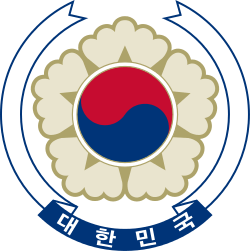Chief Justice of the Republic of Korea
 |
| This article is part of a series on the politics and government of South Korea |
| Constitution |
|
National Assembly
|
|
Judiciary
|
|
Politics portal |
The Chief Justice of South Korea is the Chief Justice of the Supreme Court of Korea. The Chief Justice is considered the head of the judicial branch of the South Korean government.
The current Chief Justice of the Republic of Korea is Yang Sung-tae.
Appointment and tenure
The Chief Justice is appointed by the President of South Korea, and subsequently confirmed by the National Assembly of South Korea. Like the other Justices of the court, the Chief Justice serves a term of six years. Unlike the other Justices, the Chief Justice may not be reappointed for subsequent terms of office.
By law, the Chief Justice of the Republic of Korea must retire upon reaching the age of 70.
Powers and duties
The Chief Justice is the head of the judicial branch of the government of South Korea, and has both adjudicatory and administrative duties. It is the duty of the Chief Justice to preside over a Grand Bench of the Supreme Court, and he or she participates in rendering the decision of the court.
In addition to the deciding of cases, one of the most important duties of the Chief Justice is in the appointment of people to the judicial bench. The Chief Justice is responsible for recommending Justices to the Supreme Court of Korea to the President of South Korea. In addition, the Chief Justice designates three of the judges who sit on the Constitutional Court of Korea. The Chief Justice also appoints the judges for all of the other courts of South Korea, and these appointments are then confirmed by the Supreme Court Justices Council.
The Chief Justice also holds the responsibility for most of the day-to-day operation of the judicial branch of the government of South Korea. He or she may present an opinion in writing to the National Assembly on the need for changes in the laws governing judicial processes. The Chief Justice also presides over the Supreme Court Justices Council, which provides rules and other important administrative functions for the judicial branch. Additionally, the Chief Justice directs the general administration of the judicial branch.
Many of the day-to-day administrative powers of the Chief Justice may be delegated to various court officials, the most important of which is the Minister of Court Administration. The Minister of Court Administration is technically a Justice of the Supreme Court, but does not hear or decide cases, but rather oversees much of the administration of the courts of South Korea with the direction of the Chief Justice.
List of Chief Justices
| № | Name | Tenure | |
|---|---|---|---|
| 1 | Kim Byung-ro | 5 August 1948 | 12 December 1957 |
| 2 | Cho Young-sun | 9 June 1958 | 10 May 1960 |
| 3 | Cho Jin-man | 30 June 1961 | January 1964 |
| 4 | Cho Jin-man | January 1964 | 19 October 1968 |
| 5 | Min Bok-ki | 21 October 1968 | March 1973 |
| 6 | Min Bok-ki | 14 March 1973 | 21 December 1978 |
| - | Yi Young-sup | 22 December 1978 | 22 March 1979 |
| 7 | Yi Young-sup | 22 March 1979 | 15 April 1981 |
| 8 | Yoo Tai-heung | 16 April 1981 | 15 April 1986 |
| 9 | Kim Yong-chul | 16 April 1986 | 19 June 1988 |
| 10 | Lee Il-kyu | 6 July 1988 | 15 December 1990 |
| 11 | Kim Deok-ju | 16 December 1990 | 10 September 1993 |
| 12 | Yun Kwan | 25 September 1993 | 24 September 1999 |
| 13 | Choi Jong-young | 25 September 1999 | 24 September 2005 |
| 14 | Lee Yong-hoon | 25 September 2005 | 24 September 2011 |
| 15 | Yang Sung-tae | 25 September 2011 | Incumbent |
External links
- www.scourt.go.kr The Supreme Court of Korea